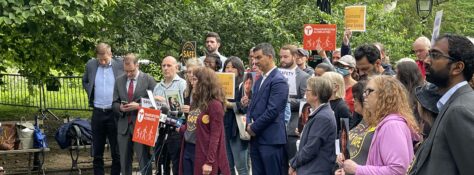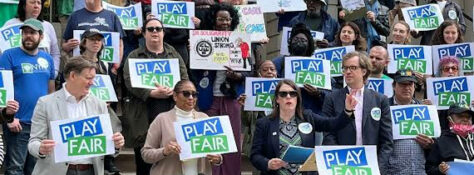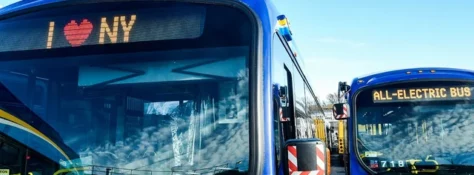The New York Legislature wrapped up its 2022 legislative session on the weekend of June 3rd, leaving Albany for the year after passing several important bills that were part of the NYLCV’s 2022 State Policy Agenda.
Learn MoreNine days after the joint press rally between the NY League of Conservation Voters, Riders Alliance, and Transportation Alternatives, the City Council, Senate and Assembly have passed a bill to expand the operating time on city speed cameras to include nights and weekends for three years. This news comes on the heels of the “potential fourth straight year of increasing traffic fatalities in NYC- a first since 1990,” showing we need enhanced pedestrian safety measures now more than ever. At the rally more than thirty people stood up for the principle that New York City should be able to control how it deploys traffic cameras on its streets. Many attendees held signs and pictures of loved ones lost to traffic violence and shared heartbreaking stories of loss and grief caused by reckless driving. Speakers included state legislators, New York City Council members, DOT Commissioner Ydanis Rodriguez, and street safety advocates, all of whom criticized, pushed, and rallied in support of the bill.
Learn MoreParks are one of the City’s most valuable assets and we must be investing in them in order to fight climate change, protect public health, and bolster the safety and wellbeing of our communities. Parks provide numerous resiliency benefits, increasing cooling by reducing the urban heat island effect and fighting flooding through capturing stormwater runoff. Parks also clean our air, and absorb climate-change causing pollutants and greenhouse gasses. Lastly parks provide safe open spaces for recreation, an aspect highlighted during the height of the pandemic. To ensure parks can continue to provide these benefits, we must be investing heavily in parks operations and maintenance.
Learn MoreEach passing day is a struggle against the clock in the fight against climate change, with continuous emissions increasing the already-heavy strain on the ozone layer. According to the Environmental Protection Agency (EPA), in 2020, transportation made up 27% of the total United States greenhouse gas (GHG) emissions, taking the lead over electricity and industry, and contributing to already-dangerous rising temperatures by putting out carbon dioxide emissions from petroleum-based fuel options. The Clean Fuels NY Coalition, led by the New York League of Conservation Voters, was formed to showcase the widespread support for New York State to create a clean fuel standard (also known as a low-carbon fuel standard) and reduce GHG emissions from the transportation sector, which accounts for 35% of overall state emissions.
Learn MoreThe New York City bus system is the largest in the nation, but also the slowest and most inefficient. An MTA bus has an average speed of 7.9mph, and spends 43% of its travel time sitting at traffic lights or bus stops. Outdated infrastructure and technology leads to constant delays and unpredictability that inconveniences those who rely on it every single day. Our bus system is in dire need of updates, especially as ridership bounces back to pre-pandemic levels. We must invest in making our buses faster and more efficient to ensure all members of our community can rely on them each and every day.
Learn MoreEvery year NYLCV and NYLCVEF celebrate the environmental progress we’ve helped create in New York City and across the State with our annual gala. This year we surpassed our fundraising goal for a total of $1.2 million, which will be used to support the work we do over the next year. Over 700 people including legislators, environmental champions, and industry leaders joined us to celebrate.
Learn MoreNews
The Climate Leadership and Community Protection Act (CLCPA), passed in 2019, established emission goals for New York to reduce the amount of greenhouse gasses it puts by 85% by 2050. Now, elected officials are considering three bills that would allow New York to take the first steps towards these goals. The All-Electric Building Act would switch the on-site heating and cooking in new buildings away from natural gas, propane, and oil heaters to zero on-site emission sources like heat pumps and induction stoves. Sponsored by Senator Brian Kavanagh and Assemblymember Emily Gallagher, this bill would put New York on a pathway to zero on-site emissions in new construction.
Learn MoreIn 2019, the City of New York passed Local Law 97 (LL97) as a part of the Climate Mobilization Act to reduce carbon emissions from buildings. This groundbreaking law puts caps on the carbon output of most buildings larger than 25,000 square feet, which make up around 50,000 of the residential and commercial properties across the city. These caps require the largest buildings to cut emissions and for the city to reduce annual emissions from city government operations starting in 2024, with decreases by 40% by 2025, 50% by 2030, and 80% by 2050.
Learn More



